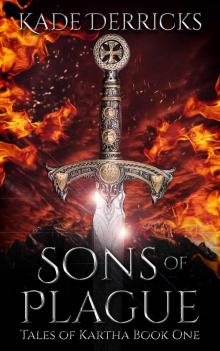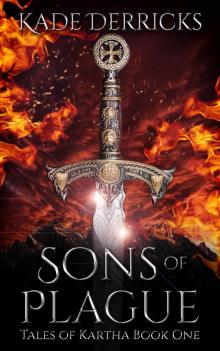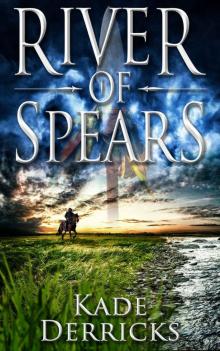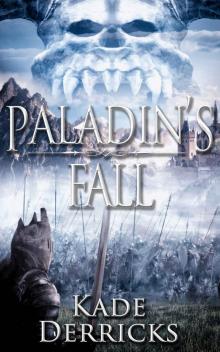- Home
- Kade Derricks
Sons of Plague
Sons of Plague Read online
Table of Contents
CHAPTER 1
CHAPTER 2
CHAPTER 3
CHAPTER 4
CHAPTER 5
CHAPTER 6
CHAPTER 7
CHAPTER 8
CHAPTER 9
CHAPTER 10
CHAPTER 11
CHAPTER 12
CHAPTER 13
CHAPTER 14
CHAPTER 15
CHAPTER 16
CHAPTER 17
CHAPTER 18
ABOUT THE AUTHOR
Sons of Plague
Copyright © 2017 by Kade Derricks. All rights reserved.
First Edition: December 2017
Visit Kade’s website to keep up on the latest news:
www.KadeDerricks.com
Cover and Formatting: Streetlight Graphics
This eBook is licensed for the personal enjoyment of the original purchaser only. This eBook may not be resold or given away to other people. If you would like to share this book with another person, please purchase an additional copy for each recipient. If you are reading this eBook and did not purchase it, or it was not purchased for your use only, then please return to retailer and purchase your own copy. Thank you for respecting the hard work of this author.
This is a work of fiction. Names, characters, places, and incidents either are the product of the author’s imagination or are used fictitiously, and any resemblance to locales, events, business establishments, or actual persons—living or dead—is entirely coincidental.
CHAPTER 1
A Grave Beginning
The blade parted the air near Cagle’s face, passing just an inch from his right eye. He swept his own sword around and behind the whistling tip, trying to force it down against the stony ground. His opponent retreated a step, dancing well clear.
“Slow,” Olinia taunted. Her sword looped wide and around in a lazy arc. “Do you mistake me for one of those side-stepping fools you normally play with up here?”
“Just setting you up for the finish,” Cagle said. He brought his narrow blade up against his chest.
“I think you forget which of us is the better swordsman. Or should I say swordswoman.”
Cagle stepped closer to Olinia. His sword struck; she countered. The blades clashed. Cagle blocked a quick thrust and then they fought on, moving with dizzying speed, steel ringing out each time the swords kissed.
Winded now, Cagle pushed himself harder. Olinia’s blade dipped two inches. Cagle whipped his sword forward. Olinia tried to block, overreaching, and at the last minute he dropped the sword low and stung her in the side.
“Oww!” Olinia howled. She hunched over, favoring her injured side. The blades were wrapped with a thick strip of leather, but the blows still stung, even through the heavy practice jerkins. “That was a lucky shot.”
“Sure it was,” Cagle smiled. His sister was good to be sure, talented beyond all except a rare few, but all his training, all his effort, and all the hard-won bruises had finally paid off. They’d been dueling since they were five after father had caught them in the orchard quarreling over an apple and placed a pair of wooden switches in their tender little hands. “If you are going to fight, learn to do it well,” he’d said.
“That’s three in a row, isn’t it? Care to go for four?” Cagle asked.
Over the years, Olinia had taken two out of every three of their matches from him. She’d always been quicker and more fierce, so Cagle reveled in today’s small string of victories. Now it seems we are on more equal footing. He had no doubt that his sister would find a way to match his skills. She had always done so before, but for a time at least he could start balancing out those losses.
“No.” Olinia tossed her blade onto a squat bench nearby. The hilt clattered against the wood. She stripped off her jerkin and threw it after the discarded sword. “It just isn’t my night. My mind is distracted, too much travel, too much to do; I have to complete my other task for father tomorrow. I’ve had enough, baby brother.”
Baby brother. That too went back to when they were children, when she’d first learned the term. Never mind the fact that she was all of two minutes older.
But for them the practice yard was empty. The Academy’s great dark ramparts loomed over them, tall and solemn, like warlocks gathered around a council fire. Few students spent more time than strictly necessary in the yard. Swordsmanship was mandatory only for the first year cadets; Cagle’s continued interest in the skill separated him from others his age. Most of the other students would go on to become merchants or officials or masters of a grand estate or enterprise. Most would be at dinner still, enjoying each other’s company, relaxing, laughing. A few, children of the newly wealthy or elevated, would be studying. For them, excellent marks would cement their families’ status among Kartha’s wealthy—a less than stellar performance and their family might slip back among the faceless lower class; Fall’s final exams were but a fortnight away.
The sky had grown dark as they dueled, the sun slipping down toward the west. Gray thunderclouds roiled overhead, and the flags of Kartha flapped taut as the wind howled through the ancient castle’s crenellations. Cagle felt the first drop of cool rain on his cheek. Olinia tilted her head back, opening her mouth, trying to catch a few.
Cagle had always been a bit jealous of his twin’s carefree spirit. Olinia was quick to anger, and just as quick to cry or laugh. One minute she was trying to outdo him at archery and the next she’d want him to help her chase rabbits. She was rash and reckless and competitive, and life for her was nothing but a grand game to be played and won. Mercurial, father called her.
I have none of that, Cagle thought. None of our mother’s easy spirit. I am my father’s son, as is my duty.
“You’re doing it again,” Olinia said. She regarded him with bright blue eyes.
“What?”
“It. Staring off into the distance. Where do you go when you look like that?”
“You wouldn’t understand,” Cagle said. Some things couldn’t be explained. Might as well try to teach a turtle to fly. Olinia rolled her eyes.
The drops were falling faster now and the old castle’s main gate was nearby. Centuries ago, the heavy portcullis had rusted away, leaving it ever open and undefended. Once it had been a great fortress, but that time had come and gone long before the lost portcullis. Deep in the Kartha highlands, miles from the coast and the quiet northern border, these days the Academy had no real need for defenses.
Cagle moved toward the archway. Lightning flashed and thunder boomed off the old keep’s granite walls. The rain was cold and, his blood no longer running hot from exertion, he felt its chilly bite.
Olinia followed. They’d just gotten underneath when the skies split open and rain crashed down in a thick curtain of gray. The deluge muffled all sounds but the thunder and the twins stood together in the center of the archway, watching it all.
“This should help the crops at least,” Olinia said, her smile crinkling the corners of her eyes.
“Yes. Maybe they’ll be wrong. Maybe there will be enough food for everyone this winter.” Cagle paused. “Then again, if it rains too much then the fields will be flooded, or they’ll catch the black rot, or—”
“Now you’re sounding like me, boy.” Olinia’s voice had changed, deeper now but with a northerner’s sharp accent. One he recognized instantly.
Cagle looked at her, but she was no longer his sister. Her blonde hair was now midnight black and cropped short, and her sea blue eyes the color of dull coal.
“That isn�
�t funny,” Cagle said.
“Sure it is,” Olinia said behind her altered face. “I think I’ll duel you in this form next time. That would knock you quite out of your steps.”
“Bevin isn’t much of a swordsman. He barely attended the class.”
“I don’t need great skills, you mud-rolling lowland bastard,” Olinia said with Bevin’s face. Her mouth twisted into a wide sneer. “I shall overcome you with the force of my very presence.”
“Enough, Olinia, no need to show off.”
Bevin’s face seemed to turn to water before morphing into Olinia’s own again. The hair changed length and turned from black to blonde once more, as well. “What did you think? Admit it. I had you going for a second or two, didn’t I?”
“Less than a second,” Cagle said without looking at her.
“Well, if it wasn’t good enough I’ll have to practice more,” Olinia teased.
“No need for that. I’m sure most would never suspect you weren’t him.”
Olinia nodded. “Excellent.”
Most people would have been shocked by Olinia’s ability, but for as long as Cagle could remember his sister had been able to alter her appearance. She wasn’t a shapeshifter in the truest sense—she couldn’t become a wolf or an eagle or a fish like some great hero of legend. Even changing size or shape was beyond her. She usually wore baggy clothing to break up the outline of her body in case she wanted to appear as a man. Her power was limited to facial appearance and voice only, and she had to study a person for a time before duplicating them. She couldn’t change too often, either; doing so gave her a splitting, debilitating headache. Once she learned someone, though, she never forgot. It was a point of great pride for her, and one of the few things she always took at least a little bit seriously.
She’d often tormented him by changing into Tilda, their old nurse. A broadaxe of a woman, she’d scared him often enough when she was alive, but his sister impersonating a woman dead ten years now unnerved him beyond measure.
“How much longer do you have to stay in this awful place?” Olinia asked.
“Two years. Father said I can leave when I turn twenty-two.”
“Creator, I don’t know how you deal with this.” She stretched out her hand and caught a handful of raindrops. “As good as it is to see you, I’ll be happy when I get back to the lowlands.”
“It doesn’t do this often.” Cagle nodded to the wall of rain. Compared to their home near Monport, the weather here was violent, shifting in what seemed like an instant. Back home in the rolling lowlands they had rain often enough, almost daily during the wet season, but it came in heavy mists and small, steady drips instead of the huge, pounding drops falling outside the archway now. The land around the Academy too was a far cry from their home, a desolate map of craggy cliffs and thick forests. A few hardened farmers scratched out a living here, hawk-faced men with gnarled hands and crooked backs, planting wheat or rye in whatever ground would take seed. Mostly the soil was thin, mere inches deep, with little but granite or chalky limestone or rough basalt beneath.
Cagle had been at the Academy for ten months now, less than halfway to honoring his father’s wishes. He longed to return to the familiar lowlands, but a part of him was drawn to this place. No, that isn’t true. I am drawn to the knowledge they keep here. Nowhere else in Kartha was there such a wealth of knowledge, and there were so many things to learn. Maybe even an answer to the plague.
Plague—the word clung to everyone’s lips these days. Even here in the north, where there was still a little food to be found, they spoke of sending their crops south to support his people.
Traditionally, the lowlands were Kartha’s breadbasket. His homeland’s terraced green fields of rice and wheat or barley and the leafy vineyards bursting with grapes and olives fed the country. Even the hilltops were planted either with leafy crowns of potatoes or spreading melon vines—at least they had been until the Fleure came. The Fleure and the rotting plague they’d left in their wake. The plague had blackened the fields, killing all the green things and turning the lowlands sooty gray with ash. The scholars from the capital still weren’t sure if the disease was natural—a stroke of ill fortune—or something the Fleure had afflicted them with. Every crop was affected, something long considered impossible, though for now the rot seemed confined to the once-fertile lowlands.
In response the northern farmers tilled fields that had lain fallow for two generations—ever since the kingdom had been reunited. They planted every inch of ground that might take seed. Cagle had even seen a cemetery with rows of grain between the monuments. Times were hard here, too. Last week he’d gone with Master Braken searching for Baphtet root, a common reagent in a number of potions and elixirs, and he’d overheard a pair of farmers complaining about sending their wheat south.
Cagle looked out into the howling storm.
If this rain doesn’t let up, most of the fields here will wash away. Then the farmers won’t have to worry about sending us food. They’ll barely be able to feed themselves.
“Nuren misses you,” Olinia said.
Cagle frowned. His sister had a way of keeping him off balance. He didn’t know what to say to that. He’d known Nuren since they were children, but until the Fleure invaded they’d been rivals more than friends, the oldest son of the distinguished Senator Ragnall Niall and the only daughter of newly-elected Senator Jales Yseril. The war with the Fleure had changed everything. Trapped behind enemy lines with Olinia and other children from the lowland’s own Academy, they’d fought back against the invaders, discovering they had much in common and falling in love along the way.
Still, they weren’t pledged. Not yet. Father hadn’t made the match. Normally that would have been his mother’s job, but she’d died giving he and Olinia life.
I need to speak with him about Nuren once my time here is over.
“She doesn’t know why the esteemed Hero of Monport is needed here,” Olinia continued. “It isn’t as if the Fleure have attacked this far north.”
Cagle felt his brows draw together. “I wish everyone would stop calling me that.”
“So do I,” Olinia agreed. She gave him a wide, toothy smile. “Honestly, you’ve no idea how hard it is hearing your baby brother is a hero. It’s almost as if we’d never won a battle before.”
Cagle returned the smile. “Love you too, sister. I don’t know what I’d do if you weren’t around to keep me centered.”
Father had always said that they looked most alike when they smiled. Each had his blue eyes and their mother’s blonde hair, though Cagle’s was a few shades darker. They had the same swarthy complexion, and at a little under six feet tall were of almost equal height. Olinia always claimed to be an inch taller, but Cagle had passed her four years ago and now she refused to measure. He suspected she wore thicker heels on her boots to make up the difference.
The rain tapered off to an occasional drop. The sun broke through from behind the great cloud mass and the sky turned a faint green tinge.
“See there. You’ve worried over nothing as usual. The harvest will be enough. The fields won’t be—” Olinia cut off when a white stone the size of a thumbnail struck outside the arch and rolled inside. Her eyes followed it. “What is that?”
Cagle ignored the question. He moved to the edge of the ancient gate and looked out. More of the stones fell, striking the ground with audible pops, bouncing and leaving small depressions in the rain-softened mud. Some were smaller than the first. Most were larger. One shattered as it struck the block near his face, throwing cold fragments against his cheek. Olinia grabbed his arm and jerked him back.
“Cagle, what is this?”
“Hail. It’s a hailstorm. It does this occasionally.” Dark clouds billowed in the distance, moving in a line north to south, horizon to horizon.
More hail stabb
ed down. Yielding to the icy assault, leaves fell from the trees in a thick carpet of green. The frozen pellets bounced among them, most now grown to the size of a man’s fist. The sound was deafening. Thousands of them fell, tens of thousands, a hundred thousand, and Cagle’s heart fell with them, sinking into the soft ground.
One hailstone the size of an apple bounced inside the arch. It rolled to a stop beside Cagle’s boot. He reached down, picked it up, and then squeezed it. The ice refused to shatter in his fist. He passed it over to his sister, and after feeling it she smashed it against the stone arch.
“Olinia,” Cagle said softly, locking eyes with his twin, “there isn’t going to be a harvest.”
A shadow, dark and formless, stalked through the forest, flitting in and out of the deep gloom and pale beams of scattered moonlight like some grim phantom. It moved without sound toward the edge of a clearing and the great sprawling manor house that stood proudly beyond.
The phantom paused at the last tree. It knelt to rest and study the still-distant house. Light shone from only one of the windows, spilling a wedge-shaped orange glow over the lawn. Empty, then. Normally there were guards stationed all along the great house, but tonight, with the master of the manor away in LaBrogue, it seemed only the lowly caretaker was in residence.
Taking a deep breath, the phantom sprinted over the huge lawn toward the house. Speed was more important now than stealth. The ground was open for almost two hundred yards around the manor—no dark corners to hide behind—not even much in the way of grass.
After half a minute of sprinting the phantom took refuge in the house’s looming shadow. Breathing hard, Olinia eased down the dark covering over her mouth and tried to gather herself. Her heartbeat raced. Her lungs screamed. She looked back over the way she’d come.

 Sons of Plague
Sons of Plague Kingdom's Forge: Book 01 - Paladin's Redemption
Kingdom's Forge: Book 01 - Paladin's Redemption Sons of Plague: Tales of Kartha Book One
Sons of Plague: Tales of Kartha Book One River of Spears (Kingdom's Forge Book 0)
River of Spears (Kingdom's Forge Book 0) Paladin's Fall: Kingdom's Forge Book 2
Paladin's Fall: Kingdom's Forge Book 2